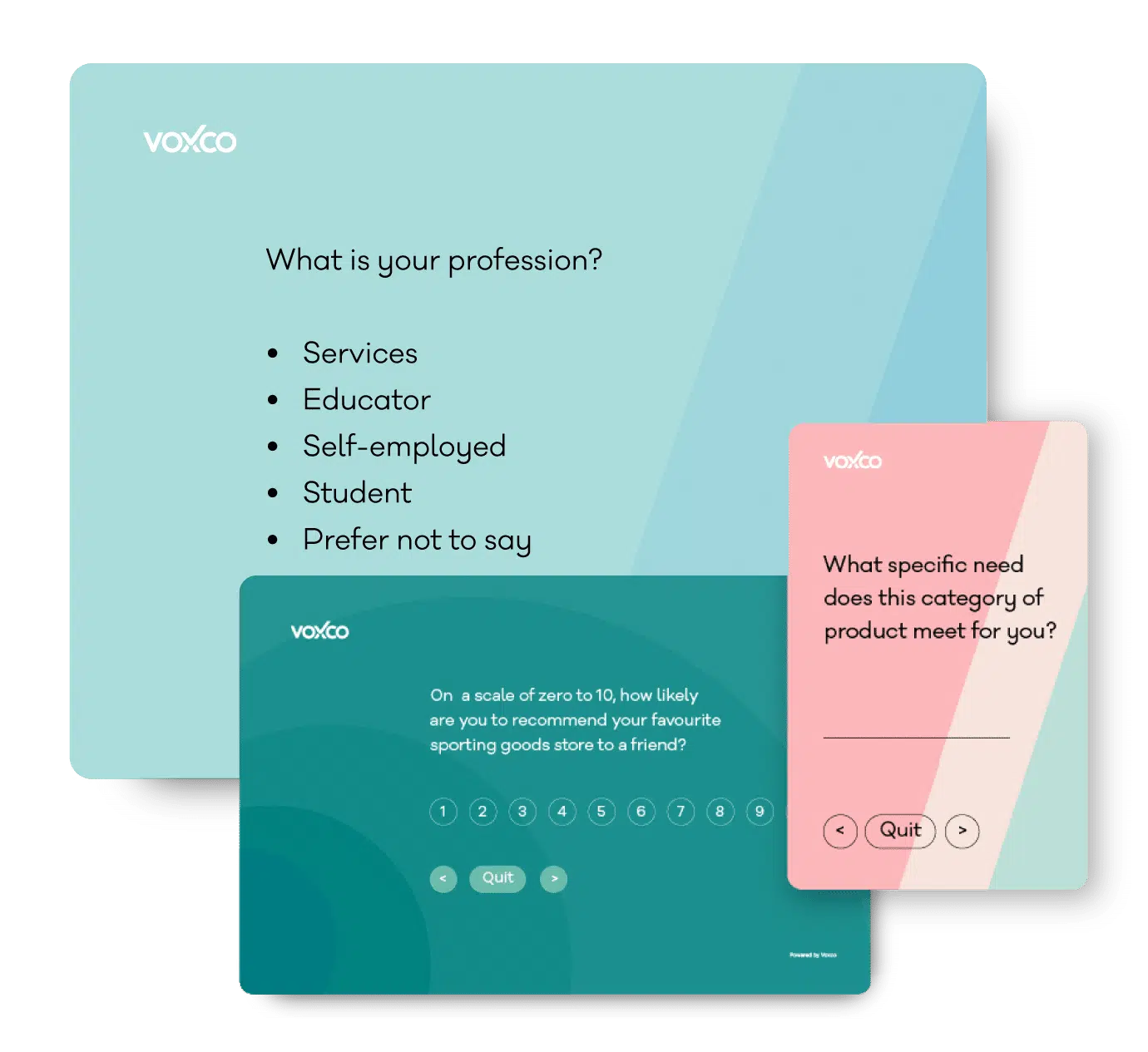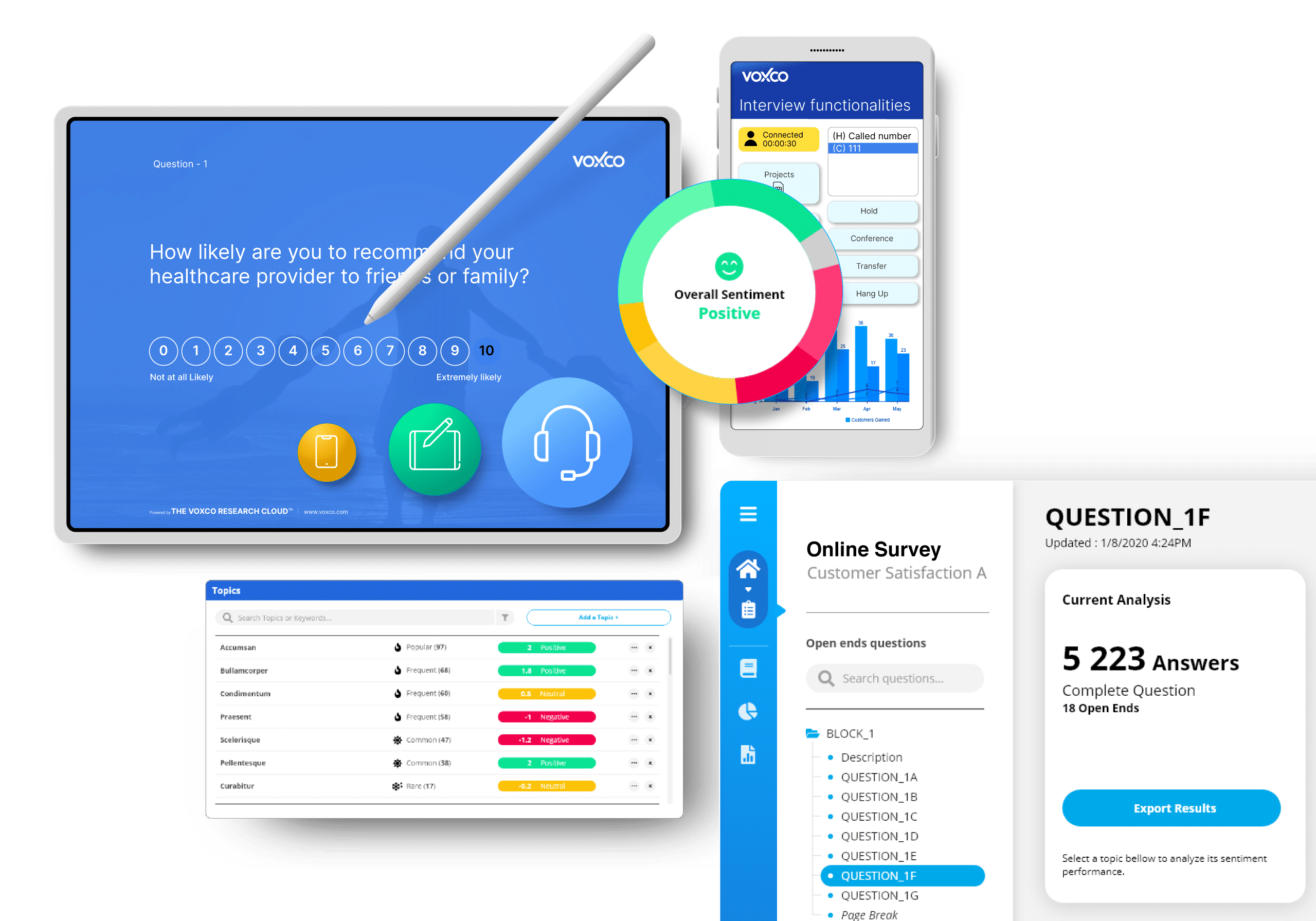Why Conducting Surveys Can Benefit Your Bottom Line
SHARE THE ARTICLE ON

Uncover The Benefits Of Surveys
Conducting surveys and processing the data that comes from this research will benefit your bottom line, regardless of the industry of your organization.
This is likely common knowledge for researchers working in industries where research is a key tenant of their offering, like social opinion, polling, market research, etc. But today, on Voxco’s Blog, we’d like to cover the benefits of surveys for those that don’t work in a directly research-adjacent industry.
But before we dive into the advantages and their impact on the bottom line, it’s important to understand the different types. The traditional way of administering a survey is a paper-based questionnaire which is either sent via post or used to conduct field interviews. With technology, it has evolved into online surveys, phone surveys, and mobile-offline surveys.
Online surveys have replaced paper-based questionnaires. Instead of posting now, we use email, sms, social media, or website pop-up. Phone surveys have evolved to integrate with computer programs, i.e., CATI or IVR. Mobile-offline surveys have replaced paper-based field interviews by using mobile devices to gather data even without the Internet.
For those looking for state-of-the-art solutions to conduct these surveys, exploring the latest market research tools can be invaluable.
Now that we have explored the different types, let’s dive into the advantages and disadvantages of surveys.
9 Benefits of surveys
The advantages of a survey are that you can administer it across diverse channels, you can reach a large population over a longer period of time, and offer incentives and promise anonymity resulting in a higher response rate and data validity.
TL;DR of some benefits of surveys-
- You can use it for a wide variety of use cases
- You can administer it across multiple channels
- You can modify a survey to meet new market trends
- It’s easy to conduct and time efficient
- You can keep it live for a longer time
- You can customize the survey to make it attractive
- The data is highly dependable
- It ensures high representativeness
- Minimizes researcher/interviewer bias
Let’s explore what these nine advantages of surveys mean.
1. You can use it for a wide variety of use cases
Surveys are not limited to only gathering feedback from old or current customers on the products and services they use. There is a wide range of use cases where you can leverage surveys to their full potential.
You can ask questions to identify the target audience and find potential new customers. You can evaluate the viability of a product or service by conducting concept testing surveys. Identify the gap between the competitor’s experiences/services and yours.
2. You can administer it across multiple channels
Flexibility is another significant benefit of surveys that make it so popular in the world of research. You can conduct surveys in three ways using modern survey software – online, phone, and mobile offline.
Online survey tools, like Voxco Online, further allow you to share surveys via email, social media, SMS, or website pop-up, enhancing your reach. You can administer telephony surveys using CATI or IVR.
Additionally, you can integrate these modes to take full advantage of the platform and conduct mixed-mode survey research, like C2 Montreal did using Voxco Online and Voxco Mobile-Offline.
3. You can modify a survey to meet new market trends
Unlike paper-based questionnaires, online surveys are not fixed. You can adjust the questionnaire according to the market trends. Functionalities like branching and skip logic further allow you to direct the flow of the survey and meet the respondent with the right question.
Instead of asking irrelevant questions or wasting the respondent’s time deciding which question to ask next, modern surveys allow you to automate the flow of the survey and make it a seamless experience.
- 100+ question types
- Advanced logic
- White-label
- Auto-translations in 100+ languages
4. It’s easy to conduct and time efficient
Survey software is user-friendly and has a short learning curve. Platforms like Voxco offer a drag-and-drop user interface, which allows you to design your surveys in less time. Additionally, functionalities like scripting reduce survey creation by 50%.
Such a DIY platform empowers you to not only take charge of your own research but also frees up your time by automating data collection, analysis, and reporting. The time otherwise spent on interviewing audiences, following up with them, and entering data into the system can be spent on other business-aligned tasks.
5. You can keep it live for a longer time
Another top advantage of a survey is that you can keep your survey live for an extended period of time. By administering it in no. of channels, you can continue to collect responses for a longer period and reach a wider audience.
6. You can customize the survey to make it attractive
Personalized and customized designs have become an integral part of marketing communication. Customers know you are capable of designing, so they don’t care a lot for those boring black-and-white content.
The same goes for surveys. Use your brand elements and design your surveys to reflect your brand image. This will not only help respondents recall and retain their experience with you but also demonstrate that you have made an effort to customize their survey experience.
7. The data is highly dependable
Modern survey platform allows you to make your survey anonymous and keep respondent data confidential. This enables you to get around many response biases allowing respondents to share their honest opinions. As a result, you gather more valuable, accurate, and reliable data.
8. It ensures high representativeness
With so many channels at your disposal, you can reach a diverse audience across the world to gather feedback. This provides a high level of representativeness. You can gather insights that reflect the relative characteristics of the target population.
9. Minimizes researcher/interviewer bias
Surveys undergo pilot testing and follow a standardized structure which reduces researcher bias. The questions are not subjective, and the lack of a moderator minimizes the impact of a researcher’s perspective.
Curious About The Price? Click Below To Get A Personalized Quote.
How surveys can benefit your bottom line?
Now that we have explored the benefits of surveys let’s dig a little deeper and see how it positively impacts the bottom line in your industry.
If you work in a corporate environment –
Understanding your customers
This is often the central interest of corporate survey distributors. We know that the data from these surveys is an asset to building customer experience journeys and robust marketing strategies.
As B2B and B2C marketing trends shift more towards personalized experiences for customers, survey data is the vehicle to getting there. In fact, an average of 71% of consumers find impersonal shopping experiences frustrating. More personalized customer strategies can directly correlate to more sales.
Getting to know your employees better
Building strong company culture starts with getting quality employee feedback. Reaching out to employees in a standardized fashion can help employers glean more clear insights that can be actioned on for a retention strategy.
Some studies state that it can cost an average of 6 to 9 months’ salary to replace a salaried employee, do candidate interviews, and train a new hire. In that regard, not investing in retention can be expensive for businesses.
If you are a patient care provider –
Improving patient satisfaction₹
Like a commercial business looking to get a gauge of customer satisfaction, patient care providers should seek to get that same understanding as well. In fact, the quality of a provider’s service may have a significant impact on the patient’s health – so it’s critical that these providers do what they can to query patients.
Patient satisfaction surveys are often conducted by phone, but the right survey software can reach patients wherever they are: whether it be online or in person in addition to the phone. This is a huge benefit for providers as patients can be difficult to reach.
Ensuring regulatory compliance
Compliance with the litany of regulations in place to protect providers and patients can be intimidating, and that may make it difficult to implement a survey research process in your workflow. That being said, in many cases, it is essential and even required that you do – for instance, HCAHPS surveys.
In other cases, concerns may be more centered around the treatment of data, like in the case of HIPAA regulations that exist to protect the information of patients.
As such, it is critical that these providers ensure their compliance and the effectiveness of their survey platform in keeping them compliant. Failure to comply with these regulations will result in costly fines and penalties.
If you are a government agency –
Conducting inquiries on their programs
Again, the surveys used to determine the effectiveness of government programs can be akin to customer satisfaction surveys. Prioritizing the satisfaction of the public in these programs is actually an essential piece to convincing budgetary powers of their needs to secure funding year after year.
An inability to demonstrate the value that their programs are delivering can, unfortunately, result in funding that is not renewed.
Supplementing the application process for grants & loans
A unique use of survey software for government agencies is to use the interface as an online application for grants and/or loans. The advantage of doing this is that agencies can ensure that applicants can be treated securely and that it is all going to a centralized database for easy processing.
This can help speed up the application processing time and is less resource intensive for government agencies that wish to save time and money.
Want to know how to increase your survey response rates?
Learn how to meet respondents where they are, drive survey completion while offering a seamless experience, Every Time!
If you are a law firm –
Improving relationships with clients
Client relationship management is very important for law firms to ensure retention and satisfaction. But it’s equally important that information is collected properly – protecting both the law firms and the clients with the right survey platform. According to a study by Altman Weil Pensa, 85% of law firms believe they should conduct formal surveys regularly to assess their clients’ satisfaction.
On the topic of legal client surveys, the website Attorneys at Work states: “You can’t fix something unless you know what’s broken.” In short, your bottom line can depend on understanding your clients’ experience with your services.
Facilitating face-to-face client communications
Law firms can use surveys to field potential clients and even include an option for the client to waive confidentiality upon completion of the survey. As such, it becomes easier for lawyers and clients to meet in person and have productive conversations.
This helps law firms get in touch with more potential clients and determine which clients would be a good fit based on their survey responses
3 Disadvantages of surveys
Now that we have explored the benefits of surveys across multiple industries let’s also remember some disadvantages.
1. It may result in non-response bias:
Your customers are receiving multiple marketing communication every day. They might miss your survey or simply choose not to participate.
When a certain group of individuals chooses not to participate, it can affect the representativeness of the population. As a result, you may end up with unreliable data.
2. Respondents may misinterpret the questions:
While the lack of a moderator minimizes response bias, it can also lead to misinterpretation of questions. Using ambiguous words, double-barreled questions, or jargon can confuse the participants. And since they have no one to clarify the meaning, it can lead to inaccurate data.
3. Your research can fall victim to survey fatigue:
In this age where data is a commodity, every big and small company is trying to gather as much data from the audience as possible. Nowadays, every app has a survey. This is causing survey fatigue which is leading to a decrease in the willingness to participate.
Voxco helps the top 50 MR firms & 500+ global brands gather omnichannel feedback, measure sentiment, uncover insights, and act on them.
See how Voxco can enhance your research efficiency.
Conclusion
Surveys are the prime tool for conducting research efficiently. It can help you gather data in real-time and reach a diverse audience by leveraging multiple channels. The benefits of surveys are undeniable to make informed business decisions, enhance customer experience, and unlock insights that can help drive growth.
FAQs
- What are the disadvantages of a telephone survey?
The disadvantages of telephone surveys are as follows:
- They may not help you reach certain demographics like those in rural areas, those without landlines, or who don’t answer unknown numbers.
- Due to caller ID, many individuals may be reluctant to answer a call from an unknown number, which can lead to lower response rates.
- It can be time-consuming.
- What is an automated phone survey system?
An automated phone survey system is also known as IVR or Interactive Voice Response. The tool uses pre-recorded voice prompts to gather feedback through keypad inputs or voice recognitions.
- How to do a telephone survey?
Here are a few simple steps to conduct telephone surveys.
- Define the goal of your survey and the insights you want to generate.
- Prepare a well-structured script with clear questions.
- Choose a sample using random dialing methods or list-based dialing to target a representative audience.
- Conduct the surveys and adhere to proper ethical guidelines.
- Analyze the data to draw valuable insights.
- What is the advantage of a mobile phone survey?
Some advantages of administering mobile phone surveys are as follows.
- It allows you to reach a broader demographic.
- Respondents can access the survey on their phones and respond to it at their convenience.
- You can include multimedia elements like video, images, and audio to enhance the survey experience.
- What are the disadvantages of automated phone systems?
The disadvantages of an automated phone system are as follows.
- It may not provide many options to personalize the interaction with human touch.
- The system cannot handle many complex inquiries.
- Malfunctions or technical issues can disrupt customer service, leading to a negative experience.
Read more

Why digital customer experience matters now ?
Why digital customer experience matters now ? SHARE THE ARTICLE ON See what question types are possible with a sample survey! Try a Sample Survey

How to use Social Media for Market Research
Harnessing Social Media for Market Research Mastery SHARE THE ARTICLE ON Table of Contents Introduction Most companies are aware of how invaluable market research is

Customer lifecycle management
Customer lifecycle management SHARE THE ARTICLE ON Share on facebook Share on twitter Share on linkedin Table of Contents What is customer lifecycle management? Customer

AAPOR Conference 2019: In Case You Missed It
Last week, some of Voxco’s team members had the pleasure of attending the 74th Annual AAPOR Conference. As silver sponsors of the event, we were
Why Data Integration Is Important
Why Data Integration Is Important SHARE THE ARTICLE ON Share on facebook Share on twitter Share on linkedin Table of Contents Introduction A business or

5 Ways To Build Trust From Survey Respondents
5 Ways To Build Trust From Survey Respondents Transform your insight generation process Use our in-depth online survey guide to create an actionable feedback collection




 English
English French
French

